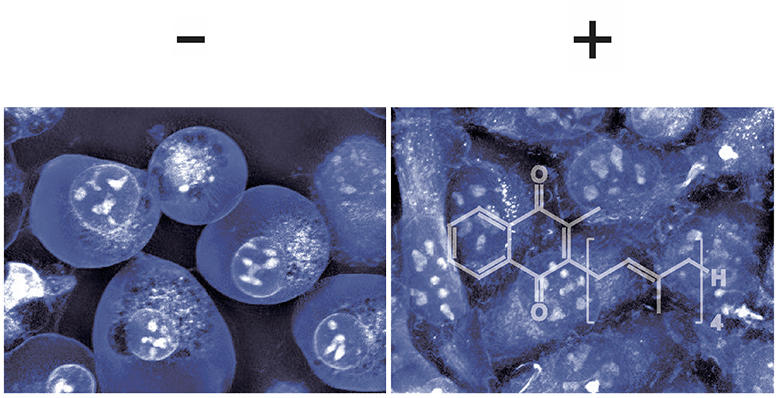
The discovery also suggests that vitamin K treatment might be an effective way to treat ferroptosis-related diseases.
Scientists discover a new function for a long-known molecule.
A team of researchers from Helmholtz Munich has discovered a new function for vitamin K, which is generally known for its role in blood clotting. The scientists found that vitamin K in its completely reduced form functions as an antioxidant by efficiently inhibiting ferroptotic cell death. Ferroptosis is a natural type of cell death in which cellular iron plays a major role and is characterized by the oxidative breakdown of cellular membranes. Furthermore, the researchers identified FSP1 as the warfarin-insensitive enzyme decreasing vitamin K, the identity of which had been speculated but remained unknown for more than a half-century.
In recent years, ferroptosis has been linked to a number of illnesses, including Alzheimer’s disease and acute organ damage. The results of this study support the idea that vitamin K treatment might be a new, effective way to treat various disorders associated with ferroptosis.

“-” cells dying by ferroptosis “+” vitamin K efficiently prevents ferroptosis. Credit: Mishima et al., Nature
Vitamin K is a potent ferroptosis suppressor
Since ferroptosis prevention is considered a highly promising approach for the therapy of many degenerative diseases, new mechanisms and compounds regulating ferroptosis are extensively being explored. To identify these new molecules, a team of researchers led by Dr. Eikan Mishima and Dr. Marcus Conrad, both from the Institute of Metabolism and Cell Death at Helmholtz Munich, along with collaborators from Tohoku University (Japan), University of Ottawa (Canada) and Technical University of Dresden (Germany), systematically studied a number of naturally occurring vitamins, as well as their derivatives.

Dr. Marcus Conrad, Director, Institute of Metabolism and Cell Death at Helmholtz Munich Dr. Eikan Mishima, Senior Scientist, Institute of Metabolism and Cell Death at Helmholtz Munich. Credit: Helmholtz Munich (c) Bettina Proneth
“Surprisingly, we identified that vitamin K, including phylloquinone (vitamin K1) and menaquinone-4 (vitamin K2), is able to efficiently rescue cells and tissues from undergoing ferroptosis” Dr. Eikan Mishima, first author of the study explained.
Unraveling the long sought-after vitamin K reducing enzyme FSP1
In 2019 a team of researchers around Dr. Marcus Conrad already identified an enzyme as a novel and strong inhibitor of ferroptosis: ferroptosis suppressor protein-1, short FSP1. The researchers have now discovered that the completely reduced form of vitamin K (vitamin K hydroquinone) is a potent lipophilic antioxidant that suppresses ferroptosis by trapping oxygen radicals in lipid bilayers.
Furthermore, they discovered that FSP1 is the enzyme that effectively converts vitamin K to vitamin K hydroquinone, resulting in a new non-canonical vitamin K cycle. Because vitamin K is important in blood clotting, the scientists further determined that FSP1 is responsible for a vitamin K-reduction pathway that is resistant to warfarin, one of the most commonly used anticoagulants.
Breakthrough in understanding vitamin K metabolism
Unraveling the identity of this enzyme solved the last riddle of vitamin K metabolism in blood clotting and elucidated the molecular mechanism of why vitamin K constitutes the antidote for overdosing on warfarin. “Our results, therefore, link the two worlds of ferroptosis research and vitamin K biology. They will serve as the stepping stone for the development of novel therapeutic strategies for diseases where ferroptosis has been implicated“, Dr. Marcus Conrad highlighted. In addition, since ferroptosis most likely constitutes one of the oldest types of cell death, the researchers hypothesize that vitamin K might be one of the most ancient types of naturally occurring antioxidants. “Thus, new aspects of the role of vitamin K throughout the evolution of life are expected to be unveiled” Dr. Marcus Conrad explained.
Reference: “A non-canonical vitamin K cycle is a potent ferroptosis suppressor” by Eikan Mishima, Junya Ito, Zijun Wu, Toshitaka Nakamura, Adam Wahida, Sebastian Doll, Wulf Tonnus, Palina Nepachalovich, Elke Eggenhofer, Maceler Aldrovandi, Bernhard Henkelmann, Ken-ichi Yamada, Jonas Wanninger, Omkar Zilka, Emiko Sato, Regina Feederle, Daniela Hass, Adriano Maida, André Santos Dias Mourão, Andreas Linkermann, Edward K. Geissler, Kiyotaka Nakagawa, Takaaki Abe, Maria Fedorova, Bettina Proneth, Derek A. Pratt, and Marcus Conrad, 3 August 2022, Nature.
DOI: 10.1038/s41586-022-05022-3









Be the first to comment on "Tremendous Potential – Vitamin K Found To Prevent Cell Death"